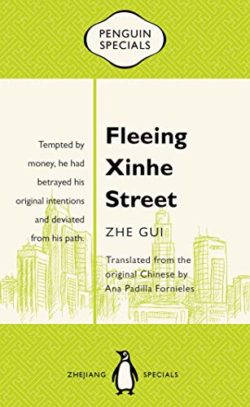Fleeing Xinhe Street, by Zhe Gui
translated by Ana Padilla Fornieles
Penguin, 2019
Publisher's Blurb
In a town where everyone has secrets, Wang Wuxian is the original conman. With a huge heart and a house full of strays, he scams everyone on Xinhe Street by getting them to invest in the One Plus One Guarantee Company. Hu Weidong is a fool that bites the bait, leaving his shoe business at risk of ruin while his wife Jiang Lina tries to pick up the pieces. Chen Naixing is the brains behind the whole operation and has the most at stake when things turn sour. All the while, Ai Mengya is the only one that has a handle on the situation. In the end, there is no easy way for anyone to run away from the trouble on Xinhe Street . . .
Reading Chinese Network Reviews
Reviewed by Tamara McCombe, 27/3/20
 Fleeing Xinhe Street is one of five novellas published as part of the Penguin Specials series which is a collaboration between the publisher and the Zhejiang Writers Association of China. The works are by 20th and 21st century Chinese authors and have recently been translated into English.
Fleeing Xinhe Street is one of five novellas published as part of the Penguin Specials series which is a collaboration between the publisher and the Zhejiang Writers Association of China. The works are by 20th and 21st century Chinese authors and have recently been translated into English.
This particular novella is a modern allegory concerning China’s changing attitude to the making and spending of money. Wang Wuxian and Chen Naixing are the masterminds behind a loan shark scheme which craftily intertwines its operations between family run businesses and all the way up to China’s banks – they are the evil present in modern China’s economy, ready to milk dry the hardworking. The women, Jiang Lina and Ai Mengya, as Mao would have said, are the women working, striving and ‘holding up half the sky’. Without their wit and skill the men would bring down the companies and money their forebears worked so hard to build and with it the moral fabric of China.
Hu Weidong represents China’s traditional entrepreneurial families, growing businesses organically over generations. Chen Naixing and Wang Wuxian are like China’s lurches since 1979 towards capitalism, offering fast and shiny returns, at the risk of losing everything that has traditionally been held dear. However, Chen Naixing and Wang Wuxian are not pure evil. The former sponsors a number of students all the way to finish their higher education whilst the latter takes in stray animals which makes the reader questions whether the means can be justified by the end.
The current Western literary climate appears to push authors to churn out texts, resulting in ill-edited chunky volumes – I often think of Hemingway who apologised for not writing something shorter because he didn’t have the time. In stark contrast Fleeing Xinhe Street is easily consumed in a single sitting, but rather than being concise it lacks character development which makes it read like an author’s pitch to a publisher. The relationships between the characters and their links to each other are fraught with potential tension and intrigue and I would have loved to have seen them play out to a higher crescendo.
Without deeper characterisation and any gradual crescendo the reader does not have the chance to unpick the author’s lessons for themselves giving the allegory less impact. Fleeing Xinhe Street is a lost creative opportunity.
Recent modern Chinese literature has flourished in the internet age, with China’s migrant working population gobbling up stories printed online. It is affordable and readily consumed. This audience is in contrast to traditional literary audiences born of the distancing intellectual and rich classes. This change in literary audience, one which is looking for an escape from the toil of their lives, has led to a trend in surrealism and fantasy, at times to a point of alienism. I was therefore relieved this work was grounded yet thoughtful.
Hopefully Zhe Gui will produce more in-depth work in the future.
Reviewed by Tamara McCombe
Reviewed by Ruth Matanda, 21/2/20
 In Fleeing Xinhe Street Zhe Gui depicts a society so capitalistic in nature that residents are encouraged to accumulate wealth through any means necessary (even illegal) by their friends, spouse and community in general. The residents of Xinhe street demonstrate an indifferent attitude when it comes to generating profit by illegal means, almost every successful business in the street seems to have succeeded due to money borrowed from the One Plus One Guarantee Company, an illegal money borrowing company run by the charismatic Wang Wuxian, who has his own selfish motivations for being involved in such shady business; to get rich and become one of the powerful residents of the neighbourhood.
In Fleeing Xinhe Street Zhe Gui depicts a society so capitalistic in nature that residents are encouraged to accumulate wealth through any means necessary (even illegal) by their friends, spouse and community in general. The residents of Xinhe street demonstrate an indifferent attitude when it comes to generating profit by illegal means, almost every successful business in the street seems to have succeeded due to money borrowed from the One Plus One Guarantee Company, an illegal money borrowing company run by the charismatic Wang Wuxian, who has his own selfish motivations for being involved in such shady business; to get rich and become one of the powerful residents of the neighbourhood.
The book shows how the lust for money as well as the desire which some of the residents of Xinhe Street have of climbing the social ladder leads to them slowly being consumed by their greed, which in turn leads to their downfall. Hu Weidong, the owner of a shoe making company is an example of this. Despite having an already successful business his desire to become a renowned company with stores across the country leads to him falling into the trap of borrowing money from what is essentially a loan shark company and in the end the collapse of the scheme not only jeopardizes his business’s future but his own life as well.
One thing I especially enjoyed about this book was the way in which Zhe Gui presented the motivations behind each character´s involvement with the One Plus One Guarantee Company: they weren't painted as being completely corrupt or selfish. Chen Naixing who is the mastermind behind the company gains his wealth through conducting illegal businesses but he is not necessarily a villain. He uses his money to fund the education of impoverished children, he helps those around the neighbourhood, and we see that he is self aware of his wrong doings.
Throughout the book Zhe Gui shows the contrasting nature of almost all of the characters, even Wang Wuxian, who we learn has a soft spot for stray animals, feeding them, caring for them even refusing to flee the country at first because he worries about what will become of them. Despite their seemingly redeeming qualities, the residents condemn themselves by refusing to walk away from the company and the profit it generates for them.
Before reading Fleeing Xinhe Street I knew very little about the existence of loan companies in China let alone how they operated, reading the book and seeing a small glimpse (albeit fictional) of the risky business of loan companies made me wonder just how popular were these companies among Chinese business owners. One aspect I loved was the social commentary on China and the criticism of the Chinese business culture, whether intentional or not as for many years, Chinese companies have been accused of using shortcuts when conducting business with other countries. To an extent we see this portrayed in the story in that the characters turn to illegal companies as opposed to the bank, as it guarantees an instant loan with a low interest (to begin with) and a higher turnover despite the risk it brings.
Generally speaking I think that the book was a good read even though I didn't really sympathise with the characters that much or really found myself invested in their future. I also found the pacing to be quite slow at times and had to motivate myself to finish reading it. But I would still say it's worth giving it a go.
Reviewed by Ruth Matanda
Reviewed by Kevin McGeary, 6/2/20
 The bare facts about China’s recent history carry within them countless stories. The economy grew by a factor of 42 between 1980 and 2017. Average life expectancy was 76 in 2016, rising from 66 in 1979.
The bare facts about China’s recent history carry within them countless stories. The economy grew by a factor of 42 between 1980 and 2017. Average life expectancy was 76 in 2016, rising from 66 in 1979.
At the same time, CO2 emissions multiplied by a factor of five between 1980 and 2014. In 2015, the percentage of national wealth held by the richest 1 percent had more than doubled since 1980.
This gilded age has given rise to a business culture that provides creative writers with lots to work with. It is a world ruled by nepotism and despotism and littered with great characters. It is one in which the path from the Forbes Rich List to prison is a well beaten one.
Just as The Great Gatsby was a product of The Jazz Age, there must be a great zeitgeist novel to be written about present day China. Zhe Gui’s novelette Fleeing Xinhe Street is a tale of ambitious people whose good intentions get them in well over their heads.
There are quirky well-drawn characters whose decisions get them into intriguing situations that could have made this book a real page turner. Unfortunately, it reads more like the synopsis of a good novel five times the length of what has been published.
The opening pages establish Wang Wuxian as a colourful and engaging protagonist, bighearted, eccentric, with a peculiar way with women (if it can even be called that), and fast-and-loose with the law. The following chapters follow the viewpoints of Wang Wuxian’s colleagues and friends.
The book is full of well-drawn characters who the reader does not get enough time with. Wang’s associate Chen Naixing is strictly monogamous with women for six month stretches, after which they all agree to an unspoken non-disclosure agreement.
There is too much exposition, describing characters instead of showing who they are through actions: “If (Jiang Lina) had any strengths in comparison to others, it would be her resilience, her initiative, and her frankness”.
That is not to say there are no funny, quirky scenes. Jiang Lina gives her virginity to the shy, simple Hu Weidong, while he repeatedly asks, “may I?” There are passages of good writing and characterization: “(Chen Naixing’s) brand of taciturnity did not allow anyone to see any depth in him.”
Ultimately, Fleeing Xinhe Street is a missed opportunity. It is documentary proof that even the most considerable talents need a ruthless editor.
Reviewed by Kevin McGeary
